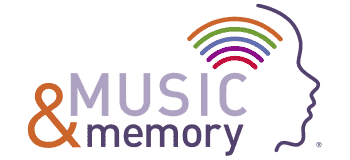
Roberta* was silent. Locked in her dementia, seemingly unaware of her surroundings, she would sit and stare at the walls of her nursing home room for hours on end.
When Music Therapist John Abel first met Roberta, shortly after he joined the staff of A.G. Rhodes Health & Rehab in Atlanta two years ago, he thought music could make the difference. And he was right. When she listened to John play the guitar and lead a group in song, after about 45 minutes, she began to respond with a word or even a phrase.
But after a while, she became less and less responsive. “The music therapy group stopped having an impact,” says John. Meanwhile, after an A.G. Rhodes board member saw Alive Inside at the 2014 Sundance Film Festival, she came back determined to bring MUSIC & MEMORY® to the company’s three Atlanta facilities. John thought Roberta would be a good candidate for the personalized music program.
“Now, with Music & Memory, I’ll put the headphones on her and within two hours she’s back at the level she had originally been in music therapy,” says John. A major benefit of the program, he believes, is the fact that she can listen to her music without any distractions. The best part, however, is giving her access to her favorite songs. An octogenarian, Roberta still loves The Grateful Dead.
“We found that out from her sister,” says John. “It totally surprised me.” He asked Karen Lupton, a professional musician who works part-time on the program for John, to set up the playlist. “I asked Roberta if she wanted other music, too,” says Karen, recalling a conversation with Roberta in her room after she’d been listening to her iPod. “She was the most verbal I’d ever heard, speaking in complete sentences. She said, ‘I would like that very much.’”
Later that day, Roberta’s physician stopped Karen in the hall. “Did I overhear Roberta and you speaking?” she asked Karen. “I was under the impression that she was completely non-verbal.”
Personalized Music Complements Music Therapy Groups
“I see Music & Memory as a nice marriage with music therapy groups,” says John. “I’m stretched so thin across our three facilities, it enables me to help individual residents without being there physically. And I know the residents are hearing music that really benefits them, not whatever is pumped through speakers to the dining room.”
“The personalization factor is so important,” adds Karen, who originally came to A.G. Rhodes as a volunteer a year ago in April after hearing about an iPod drive, and soon was hired to help implement Music & Memory as the program grew.
“Sometimes people who love music don’t want to be in groups or just don’t want to leave their rooms,” she adds. “We have one resident who doesn’t like to join groups but loves old show tunes. The activities staff told me he liked to sing Old Man River, so I made up a playlist of Broadway music. He knew so many of the songs and would sing all the words.”
Another resident who trained as a classical pianist would attend the music therapy groups occasionally, but missed hearing Bach and Chopin. “She wanted very specific pieces of music, rather than just hearing them playing in her head,” says John. “When she got her iPod, she said, ‘I never thought I’d hear this music again. I can’t play it anymore.’”
Then there was the resident who loved opera. “I asked her if she had a favorite performer,” says Karen. “All she could come up with was ‘butterfly, butterfly.’ I assumed she meant Madama Butterfly, so I created a playlist with Puccini’s greatest arias. When she first listened, she said these were her favorites. I came back later to see how she was doing. She said, ’I feel more like myself than I have in years.’”
Karen says the opera lover’s son is a big proponent of the program and gives his mother her playlist to help her manage dementia and hallucinations. “As her confusion gets worse, he pushes the music to help ground her,” says Karen.
Hearing Favorite Music Eases Confusion and Agitation
John adds that staff have found the personalized music to be a great assist with other residents who are confused and agitated. “We were having trouble giving one woman a shower,” he says. “She would become very physically and verbally aggressive. So we started playing her music—gospel, R&B—when she was in the shower, using an external speaker. It gave her something else to focus on, something calming, even though the shower is stressful for her.”
After a year implementing Music & Memory, A.G. Rhodes has about 80 residents participating across all three facilities, which range from 130 to 150 beds at each location. John and Karen agree that the program is an essential tool and hope to expand access to even more residents.
“People love John’s music therapy groups,” says Karen. “He often repeats the same songs as a form of analysis, to see who remembers. And people love the personalization of the iPods. They can immerse themselves in their own playlists. We don’t generally sing Broadway shows or Michael Jackson in groups. Music & Memory and music therapy groups are complementary.”
*Name changed to protect privacy.
Founded in 2010, MUSIC & MEMORY® is a non-profit organization that brings personalized music into the lives of people with cognitive or physical challenges through digital music technology, vastly improving quality of life.
